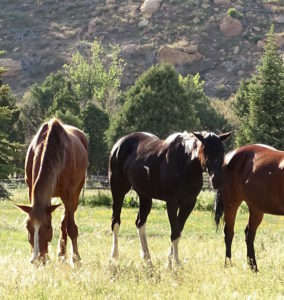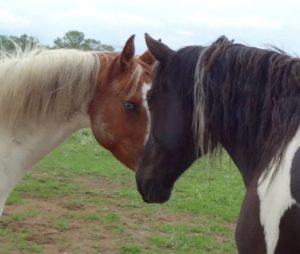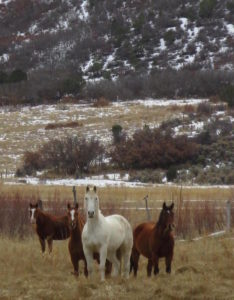Editor’s Note:
 Dr. Sheryl King is professor emeritus of Southern Illinois University, a Fellow of the Equine Science Society, a Best Horse Practices Summit board member, and lifelong horsewoman. In this guest column, she writes about the range of benefits from working and owning horses.
Dr. Sheryl King is professor emeritus of Southern Illinois University, a Fellow of the Equine Science Society, a Best Horse Practices Summit board member, and lifelong horsewoman. In this guest column, she writes about the range of benefits from working and owning horses.
By Dr. Sheryl King
How thoroughly amazing it is that two species so different– evolutionarily and by character – can often become, with a little effort, planning, and sensitivity, so connected to one another. How ironic that this attraction of opposites can often morph into a destructive relationship for the horse despite our best intentions.
When we misinterpret our relationship with our horse, when we move beyond the role of caring steward to treating the horse like an extension of ourselves and our family, we err to the detriment of the horse. We end up loving it badly.
 Horses are horses. People are people. Try as we might, the two will never be the same, and as the saying goes, “Vive La Difference!”
Horses are horses. People are people. Try as we might, the two will never be the same, and as the saying goes, “Vive La Difference!”
What am I getting at?
Some examples:
1. We all understand that the horse is strictly an herbivore. Humans, by nature, are not. As omnivores, we eat a variety of foods; variety keeps us healthy. As grazers, horses eat the same thing, day in, day out – grass or hay. They like it that way; indeed, they need it that way to stay healthy. When we love our horses to the point where we project our humanness on them, we tend to try to change their nature toward ours.
We give them variety.
We give them grain because we love to hear that nicker of appreciation.
We give them treats to show them how much we care for them.
We give them all kinds of supplements because companies convince us that we are better owners for doing so.
 All of the above often compromises our horses’ digestive, metabolic, even skeletal health.
All of the above often compromises our horses’ digestive, metabolic, even skeletal health.
2. Horses evolved to live outdoors, in the open. They seek shelter only in the most extreme of weather. They have developed a most marvelous skin and hair coat to protect them from all that nature can dole out. Humans were not so blessed. We seek shelter most of the time and we need to artificially cover our bodies to deal with the elements and we project this habit to our horses.
We put our horses indoors; we sometimes even heat that indoor space.
We cover them with all manner of blankets, sheets, coolers or slinkies
These horses often suffer in myriad ways – behavioral problems, respiratory disease, digestive problems, skeletal, and hoof problems. The list goes on.
3. Horses evolved with a need to roam. Even in a pasture, most horses will cover 10 or more miles a day. It is their nature to wander and seek nourishment throughout most of their day. What modern humans consider strenuous exercise is just day-in-the-life movement to a horse.
 They need to walk, run, roll, rear, kick. But we humans live in communities; most of us have limited land on which to keep our horses, and many of us want to control where a horse goes, when, and how. Idleness is bad for a horse’s mind and bad for its body. To a horse, W-O-R-K is not a four-letter word; the domesticated horse needs a job and they need to report to work daily.
They need to walk, run, roll, rear, kick. But we humans live in communities; most of us have limited land on which to keep our horses, and many of us want to control where a horse goes, when, and how. Idleness is bad for a horse’s mind and bad for its body. To a horse, W-O-R-K is not a four-letter word; the domesticated horse needs a job and they need to report to work daily.
4. Perhaps our worst disservice is to impose our own emotions and moral values on horses. Their code of ethics is not a human code of ethics. When we think of our horses as our four-footed “equine children,” we fall prey to the notion that horses deserve human rights. Conferring human rights on animals means that by owning them, we exploit them. Moreover, sliding into this way of thinking about gives power to groups who believe:
Horses are pets, not livestock, and are therefore subject to all the controls that we impose on pets
Horse jobs are forms of cruelty
Horses should not be owned by humans at all (i.e. owning pets is a form of slavery and should be banned).
When we allow horses to become pets or otherwise support an animal rights’ agenda, we risk ceding control of how we manage horses to the animal rights groups’ version of “humane.” These groups may advocate:
- Taking away your horse’s job,
- Keeping them only in an unnatural, controlled environment
- Labeling as animal cruelty the keeping of a horse simply, as horses should be kept.
The Take-Home messages:
Recognize that horses are not humans.
Put the needs of the animal above those of the human.
The next time you catch yourself doing “something special” for your horse, stop. Think. Are you really doing this for your horse, or are you doing it for you? If it is really for you, is it also good for the horse?
Beware false prophets of equine welfare – what they preach may actually be bad for horse’s health.
Dr. King, Thanks once again for helping to educate horse owners about what science says is best for our horses.
Having our own temperature regulated room, a barn coat, 3 square meals with desert and a sedentary life style might not even be all that good for a human but certainly have negative impact on equine welfare.
Thank you Dr. King for another thoughtful article that can help horse owners be more aware of what a horse REALLY needs. The more these subjects are talked about, backed by science, the easier it is to have a conversation with folks who want to do it “the way they learned” in relation to equine care.
So easy to fall into these practices for all of us animal lovers but of course understanding the nature of the horse helps to lead us down the right trail. Thank you for the reminders and for the science.
Cheers and merry Christmas
Your last line is so important in today’s world. If we are not careful some of these people will make us have the horse live in our house with us to be kind to the horse. The horse is a horse and we love them, but they must remain a horse. Wish I could be there this year. I really loved last year.
Yes yes yes!! Once you are awakened, it is sad to see how much you see around you…